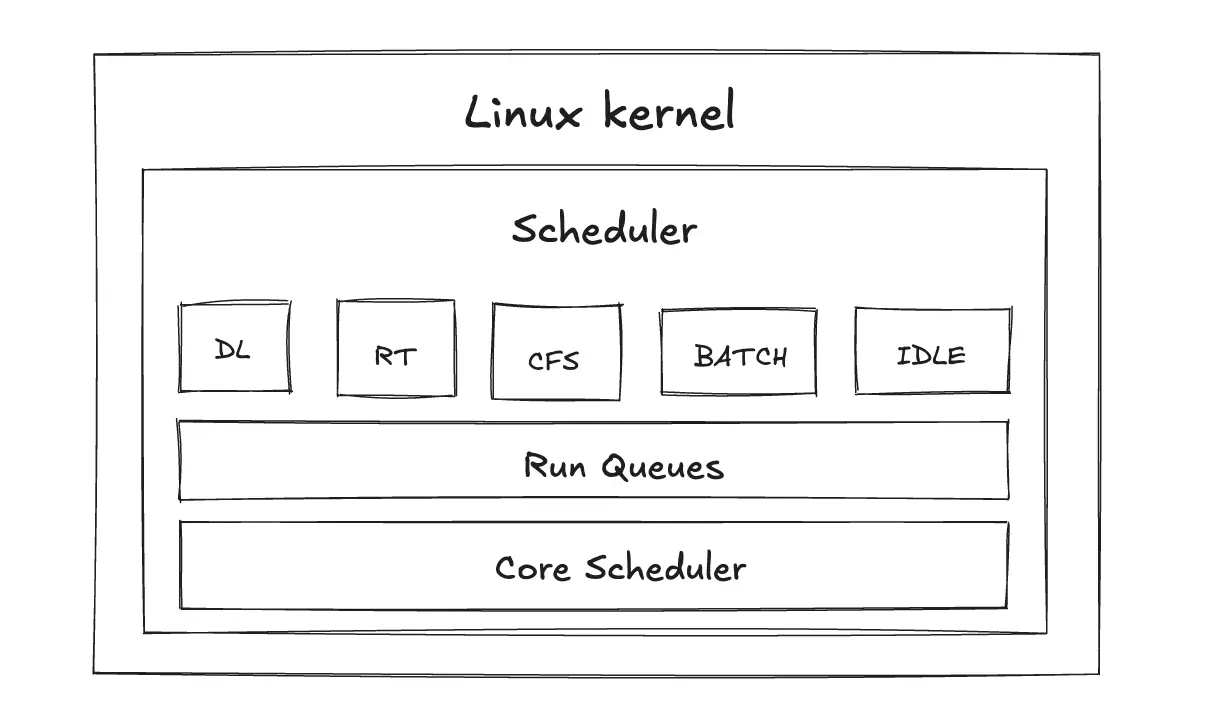A Comprehensive Guide to Linux Kernel Schedulers

The Linux kernel scheduler is the backbone of process management. It decides which processes get CPU time and when. In this guide, we’ll explore the basics of Linux schedulers, their types, and how they improve system performance.
What is a Linux Kernel Scheduler?
A kernel scheduler is responsible for managing CPU resources. It ensures fair distribution among processes, reduces latency, and maximizes throughput. It’s a critical component for multitasking and responsive systems.
Schedulers manage processes based on their priority, type, and CPU usage. They determine whether a system feels smooth or sluggish under heavy workloads.
Why Are Schedulers Important?
Schedulers ensure the efficient use of CPU resources. A good scheduler strikes a balance between:
- Performance: Maximizing throughput while minimizing latency.
- Fairness: Equal CPU time for all processes unless priorities differ.
- Energy efficiency: Reducing power consumption on laptops and mobile devices.

Types of Linux Kernel Schedulers
Linux supports different schedulers to handle various workloads. Let’s look at the major types:
1. Completely Fair Scheduler (CFS)
The CFS is the default scheduler for most Linux distributions. It’s designed for fairness and is ideal for general-purpose workloads.
Key Features of CFS:
- Uses a red-black tree to manage tasks efficiently.
- Provides equal CPU time to all tasks (based on weight).
- Handles interactive and CPU-bound tasks effectively.
CFS also allows fine-tuning through parameters like sched_latency_ns and sched_min_granularity_ns.
2. Real-Time (RT) Scheduler
The RT scheduler is designed for real-time workloads. It prioritizes time-sensitive tasks, ensuring they are executed immediately.
Key Features of RT Scheduler:
- Two policies: SCHED_FIFO and SCHED_RR.
- SCHED_FIFO: Executes tasks in a first-come, first-served order.
- SCHED_RR: Implements round-robin scheduling for fairness.
- Ideal for audio processing, robotics, and industrial automation.
RT tasks have higher priority than normal tasks, making them critical for latency-sensitive operations.
3. Batch Scheduler
The batch scheduler is optimized for non-interactive, CPU-intensive tasks. It runs processes with minimal interruptions, ensuring maximum throughput.
Use Case:
- Best for long-running computations, like video encoding or scientific simulations.
4. Deadline Scheduler
The deadline scheduler ensures tasks are completed within a specific time frame. It’s commonly used in systems requiring strict timing constraints.
Key Features of Deadline Scheduler:
- Tasks have deadlines, periods, and runtime parameters.
- Ideal for embedded systems and high-performance computing.
5. Idle Scheduler
The idle scheduler runs when no other tasks are available. It conserves power by putting the CPU into low-power states.
How Linux Schedulers Work
Schedulers use priorities and policies to decide task execution. Each process is assigned a nice value (priority). Lower nice values mean higher priority.
Process Execution in Linux:
- Task Enqueueing: Processes are added to a run queue.
- Scheduling Decision: The scheduler selects the next process to run.
- Context Switch: The kernel switches from one process to another.
The run queue differs for each scheduler. For example:
- CFS uses a red-black tree for fairness.
- RT schedulers use priority-based queues.
Tuning Schedulers for Performance
Linux allows you to tweak schedulers using tools like chrt and sysctl.
Changing Scheduler Policies
You can set policies using the chrt command:
chrt -f -p 99 <PID> # Set a process to FIFO with priority 99
Adjusting CFS Parameters
Modify CFS behavior via /proc/sys/kernel/sched_* values. For example:
echo 2000000 > /proc/sys/kernel/sched_latency_ns # Increase latency
Choosing the Right Scheduler
Some workloads benefit from specific schedulers:
- Interactive systems: CFS for fairness.
- Real-time applications: RT or deadline schedulers.
- Batch processing: Batch scheduler.
Why Schedulers Matter in DevOps and SRE
Efficient schedulers are critical for server performance. They minimize downtime and improve responsiveness in high-traffic environments. Understanding schedulers helps DevOps teams optimize systems for better resource utilization.
Enhance Incident Management with Akmatori
Schedulers are vital for smooth server operations. To take incident management to the next level, try Akmatori. Akmatori automates incident response, reduces downtime, and ensures your infrastructure runs smoothly.
Cost-Effective Infrastructure with Gcore
Need reliable virtual machines or bare metal servers? Gcore offers affordable, high-performance infrastructure across the globe. Scale your workloads with ease.
Conclusion
Linux kernel schedulers are the unsung heroes of system performance. They ensure fair resource allocation, optimize responsiveness, and cater to diverse workloads. By understanding and tuning schedulers, you can unlock better performance for your systems.
Explore how Akmatori can further improve your infrastructure. And don’t forget to check out Gcore for affordable, global server solutions.
Thanks for reading! If you found this guide useful, feel free to share it with your peers.
